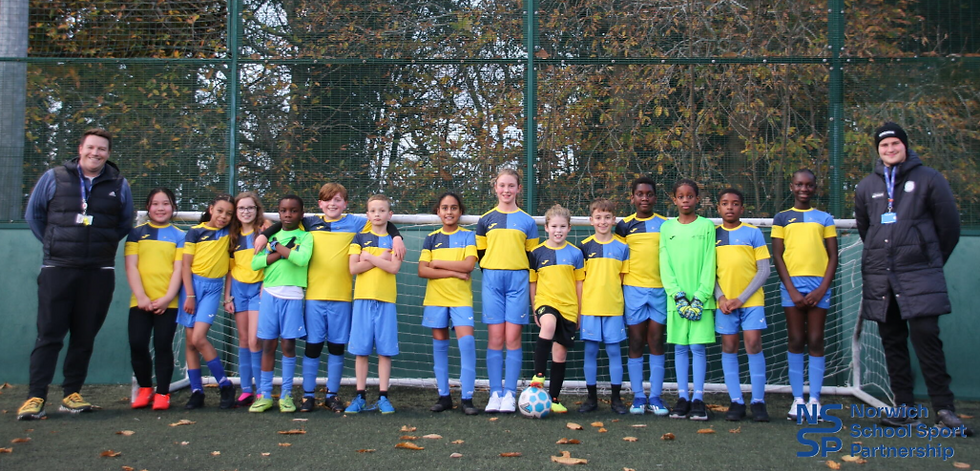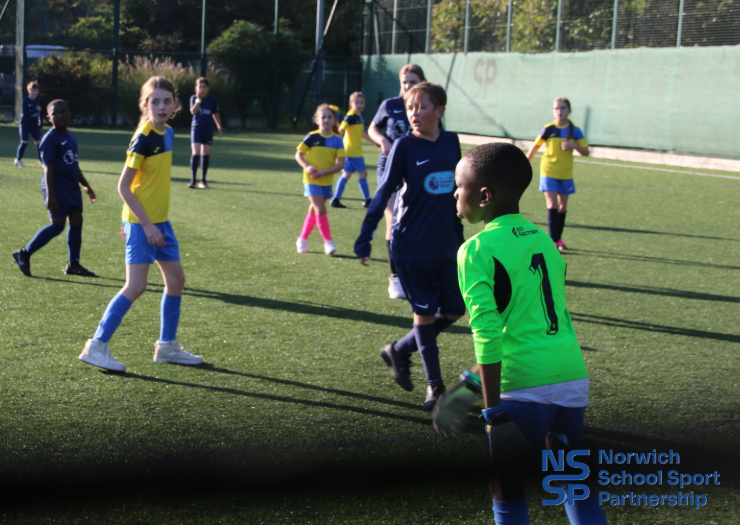Charles Darwin Primary Case Study – Transitioning with RISE Up
- Neil @ Future Action
- Mar 24
- 8 min read
Updated: Mar 25
Transitions can be challenging for young students, especially our most vulnerable. At Charles Darwin Primary in Norwich, brilliant PE Lead James Tuthill and his team embraced the Norfolk RISE Up Transition Pilot to support students through key changes, using movement-based wellbeing strategies to build emotional resilience.
This case study explores how the school has created a culture where students feel safe, supported, and ready for their next steps.
Intent: Meeting Students Where They Are
What were your initial goals for implementing the Norfolk RISE Up transition programme in your school?
James Tuthill explains, “Initially, our main focus was on supporting Year 6 students as they transitioned into secondary school.
With our Year 6 cohort still relatively new, we saw the RISE Up programme as a great way to build stronger relationships with Jane Austen College and ensure our most vulnerable students had the support they needed.
However, as we rolled the programme out, it became clear that even our youngest students were showing signs of emotional challenges, particularly after lockdown.”
The school soon expanded the RISE Up programme to include a Year 1 and 2 group, starting every Monday morning with calming, purposeful activities. “We’ve now created a small group of seven children who begin their week with gratitude practices, gentle breathing exercises, and a Stormbreak video tailored to their emotional needs from the previous week.
We have edited the RISE Up resources to include characters from Inside Out and our children have loved it.” says James.
How did you identify the specific needs of your students in relation to mental wellbeing, trauma, and vulnerability before the programme started?
“Through discussions with our SENCo, we noticed some of our Key Stage 1 children weren't receiving support for their emotional needs. They often struggled with mornings and found it hard to settle,” James shares. “One young boy who would cry every morning now walks in happily on RISE Up days, excited to start his week.”
For older students, the school focused on those struggling with anxiety or class engagement. “We combined Year 3-6 students into one group during assembly time, and activities like boxercise stress-busters and skipping challenges have really helped them.
A Key Stage 2 child who suffers with anxiety has found great comfort and an avenue to speak with trusted adults in the sessions. On RISE Up mornings, he lights up.”
Implementation: Embedding Wellbeing into School Life
How did you integrate the RISE Up early intervention mental wellbeing strategies into your school?
“We started by identifying those who would benefit most, particularly our most vulnerable students,” James explains.
“In Year 1 and 2, it’s about setting up a calm, structured start to the week with simple activities that help the children feel secure and engaged. The combination of gratitude reflections, breathing exercises, yoga, and Stormbreak videos has been really effective in helping them regulate their emotions.”
For the older children, James introduced more dynamic activities, like skipping and boxing. “Every child now has access to a skipping rope at social times, and we use the Skip2bfit two-minute challenge to help them manage their energy and emotions. It’s a great way to engage them physically while calming their minds.”
The school also introduced “Monday’s Court Sport,” a space during break times where staff lead or encourage students to try different movement challenges.
“It’s become a highlight for many children, giving them an opportunity to explore new activities in a supportive setting.”
How has the 1-2-1 Stormbreak intervention been implemented to support vulnerable students?
“We’ve used the 1-2-1 Stormbreak intervention for four of our most vulnerable students, and it’s been an essential tool for giving them the support they need,” James says. “These sessions are led by our behaviour lead and provide a safe space for these children to focus on their emotional and mental wellbeing. We have also used their video’s in our RISE Up intervention sessions.”
Impact: Positive Outcomes for Students and Staff
The RISE Up programme has delivered measurable improvements across Charles Darwin Primary.
After two terms of intervention, class teachers have reported that students are more engaged in class following their RISE Up sessions. “There’s a noticeable difference in how they manage their emotions and interact with staff,” says James.
“Our trusted adult questionnaire revealed that many students now see their RISE Up lead teacher as someone they trust and can talk to, which is a huge step forward for them emotionally.”
Data from the Warwick-Edinburgh Mental Wellbeing Scale (WEMWBS) reflects these changes. Teachers completed an adapted WEMWBS survey pre- and post-intervention to measure their perception of student mental wellbeing for their specific RISE Up focus group.
Before the intervention, many students were perceived as rarely feeling optimistic, relaxed, or able to manage their wellbeing.
Following the programme, these same students were reported as feeling “more of the time” in every wellbeing category, from feeling optimistic about the future to managing their own wellbeing.

"Seeing such a significant change in our pupils' wellbeing has been incredibly rewarding. This 68.42% improvement in our perception of their mental health reflects the positive impact of the strategies we’ve implemented. It’s clear that prioritising their resilience and emotional development is making a real difference in their lives."

In addition to the WEMWBS data, the school has made huge strides on their School Wellbeing Scorecard. "We initially scored 48% when we started the programme in October 2022,” James notes. "Now, we are at 92%. That’s an incredible reflection of how far we’ve come in improving the provision for the wellbeing of our students."
Pre Intervention
Post Intervention
Parents have also noticed the difference. One father of a Year 4 boy shared how his son, who previously shied away from physical activity, now loves coming to school for RISE Up sessions. “He’s glowing,” the father said. “He’s never been this excited about school.”
The impact of the programme goes beyond the classroom, as students are encouraged to bring their experiences from school into their daily lives. “We have a notice board where children bring in pictures of themselves doing RISE activities outside of school,”
James shares. “It’s part of our effort to celebrate their activities and what drives them, building motivation for healthy, active lifestyles. Our #maxyourdays mural, inspired by Joey Feith, showcases these moments and reminds the children that they are capable of greatness every day.”
How did the Norfolk RISE Up Pilot Transition Programme support your school?
The Norfolk RISE Up Pilot Transition Programme has been instrumental in supporting us during student transitions, particularly for our most vulnerable children. Through the pilot, we were able to:
● Support children and young people to be ‘ready’ for school – This programme gave us the structure and tools to ensure that students felt more prepared and confident when starting their school day or transitioning to a new school.
● Support individual needs – The pilot allowed us to focus on students who required additional support, especially those with SEND, trauma backgrounds, or specific vulnerabilities, offering them personalised interventions through RISE Up and the Stormbreak intervention.
● Create a welcoming, safe, and engaging environment – By integrating RISE Up into our daily routines and using safe spaces like our RISE Up club, we fostered an environment where children felt secure and ready to learn.
● Develop safe and trusting relationships – The programme has played a major role in building trust between staff and students, with many students now identifying their RISE Up lead as a trusted adult they can turn to. We have also created pupil profiles to share with staff at Jane Austen College to help their staff build relationships with our young people.
● Reflect on our transition programme – The Norfolk RISE Up pilot helped us reflect on and improve our transition strategies. It encouraged us to focus on student feedback and ensure that key information is passed to secondary school staff to build deeper connections. The programme has also helped build our relationship with the brilliant PE team at Jane Austen College, and we are excited to develop this further.
"The RISE Up intervention has helped improve challenges across our target group and beyond, including transition, attendance, attainment, behaviour, engagement, mental health, personal development, support for SEND students, and our most vulnerable children."
Looking Forward: Growing the Impact
Looking ahead, Charles Darwin Primary is committed to continuing the RISE Up programme and further embedding its principles into daily school life. “We plan to weave RISE Up activities into our PE curriculum,” James says, “and we’ll continue the Monday morning intervention group to measure and track its impact on attendance. So far, we’ve seen great improvements in attendance on RISE Up days.”
The school is also strengthening its relationship with Jane Austen College, particularly with their PE department and Year 7 transition staff, to ensure that every student feels confident and supported as they move into secondary school.
“This programme has really transformed the way our students think about school, movement, and their own emotional wellbeing,” James concludes. “We’re excited to keep building on that.”
A Heartfelt Thank You
A huge thank you to Mr. Tuthill and the entire team at Charles Darwin Primary for their dedication to transforming children's mental wellbeing and life chances.
Their commitment to creating a safe, supportive environment is truly inspiring. As students step into their Sport Sanctuary each morning to the uplifting sound of Andra Day’s RISE Up, they are reminded of their strength and potential.
We invite you to take a listen and rise up for your young people—because every child deserves the chance to thrive. 💛🎶
(C) 7clouds - Andra Day - RISE Up - https://www.youtube.com/watch?v=FBuIBaDSOa4
👉 You can check out a 15-minute podcast exploring this case study in more depth here.

Fully Funded Training for Norfolk Schools
As part of the Norfolk RISE Up programme, Norfolk County Council is fully funding access to Future Action's RISE Up Early Intervention Mental Wellbeing and Trauma-Informed PE Teacher Training Courses for all primary, secondary, and special schools in Norfolk.
Since September, over 80 Norfolk schools have signed up, and we'd love for your school to join us in this vital initiative.
These courses equip educators with tools to improve student wellbeing, build resilience, and create safe, nurturing environments.
Sign Up Now
To access the fully funded courses for the 2024-25 academic year, complete our brief one-minute form here:
Once registered, you’ll receive an email with all the details needed to start your training and transform your teaching practice.
Opportunities for Schools Outside Norfolk
If you’re based outside Norfolk, there are still opportunities to enhance student wellbeing in your school:
Start with Our School Wellbeing Scorecard: Complete this 3-minute quiz to map your school’s wellbeing provision and identify key focus areas tailored to your needs.
👉 Access the School Wellbeing Scorecard Here
Explore Further Support
We offer a range of additional services to support your school's wellbeing initiatives:
Specialist courses and consultancy.
Keynote speaking engagements.
Access to our book: ‘Time to RISE Up’.
👉 Join Our Waiting List Here
Learn More About Stormbreak Shine
The Stormbreak Shine Programme played a crucial role in the Norfolk RISE Up Transition Pilot, providing targeted 1-to-1 support through mentally healthy movement and conversation time.
Thank you for all you do to transform the life chances of your young people.
Have a brilliant week.
Neil Moggan and the Future Action Team
P.S. Do subscribe to our weekly newsletter to stay informed and receive the latest wellbeing insights and case studies.


















Comments